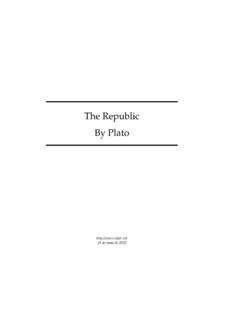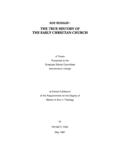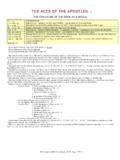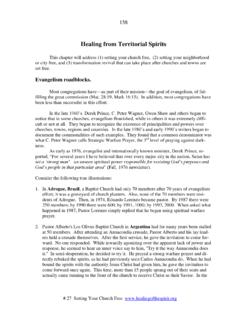Transcription of The Life of Alexander the Great By Plutarch - Dicas-L
1 The Life of Alexander the GreatBy PlutarchIt being my purpose to write the lives of Alexander the king, and of Caesar, by whomPompey was destroyed, the multitude of their Great actions affords so large a field thatI were to blame if I should not by way of apology forewarn my reader that I have chosenrather to epitomize the most celebrated parts of their story, than to insist at large onevery particular circumstance of it. It must be borne in mind that my design is not towrite histories, but lives. And the most glorious exploits do not always furnish us withthe clearest discoveries of virtue or vice in men.
2 Sometimes a matter of less moment,an expression or a jest, informs us better of their characters and inclinations, than themost famous sieges, the greatest armaments, or the bloodiest battles as portrait-painters are more exact in the lines and features of the face inwhich the character is seen, than in the other parts of the body, so I must be allowed togive my more particular attention to the marks and indications of the souls of men, andwhile I endeavor by these to portray their lives, may be free to leave more weightymatters and Great battles to be treated of by is agreed on by all hands, that on the father's side, Alexander descended fromHercules by Caranus, and from Aeacus by Neoptolemus on the mother's side.
3 His fatherPhilip, being in Samothrace, when he was quite young, fell in love there with Olympias,in company with whom he was initiated in the religious ceremonies of the country, andher father and mother being both dead, soon after, with the consent of her brotherArymbas, he married her. The night before the consummation of their marriage, shedreamed that a thunderbolt fell upon her body, which kindled a Great fire, whosedivided flames dispersed themselves all about, and then were extinguished. And Philipsome time after he was married, dreamt that he sealed up his wife's body with a seal,whose impression, as he fancied, was the figure of a lion.
4 Some of the divinersinterpreted this as a warning to Philip to look narrowly to his wife; but Aristander ofTelmessus, considering how unusual it was to seal up anything that was empty, assuredhim the meaning of his dream was, that the queen was with child of a boy, who wouldone day prove as stout and courageous as a lion. Once, moreover, a serpent was foundlying by Olympias as she slept, which more than anything else, it is said, abated Philip'spassion for her; and whether he feared her as an enchantress, or thought she hadcommerce with some god, and so looked on himself as excluded, he was ever after lessfond of her conversation.
5 Others say, that the women of this country having always beenextremely addicted to the enthusiastic Orphic rites, and the wild worship of Bacchus,(upon which account they were called Clodones, and Mimallones,) imitated in manythings the practices of the Edonian and Thracian women about Mount Haemus, fromwhom the word threskeuein, seems to have been derived, as a special term and over-curious forms of adoration; and that Olympias, zealously affectingthese fanatical and enthusiastic inspirations, to perform them with more barbaricdread, was wont in the dances proper to these ceremonies to have Great tame serpentsabout her, which sometimes creeping out of the ivy and the mystic fans, sometimeswinding themselves about the sacred spears, and the women's chaplets, made aspectacle which the men could not look upon without , after this vision, sent Chaeron of Megalopolis to consult the oracle of Apollo atDelphi.
6 By which he was commanded to perform sacrifice, and henceforth pay particularhonor, above all other gods, to Ammon; and was told he should one day lose that eyewith which he presumed to peep through the chink of the door, when he saw the god,under the form of a serpent, in the company of his wife. Eratosthenes says thatOlympias, when she attended Alexander on his way to the army in his first expedition,told him the secret of his birth, and bade him behave himself with courage suitable tohis divine extraction. Others again affirm that she wholly disclaimed any pretensions ofthe kind, and was wont to say, "When will Alexander leave off slandering me to Juno?
7 " Alexander was born the sixth of Hecatombaeon, which month the Macedonians callLous, the same day that the temple of Diana at Ephesus was burnt; which Hegesias ofMagnesia makes the occasion of a conceit, frigid enough to have stopped theconflagration. The temple, he says, took fire and was burnt while its mistress wasabsent, assisting at the birth of Alexander . And all the Eastern soothsayers whohappened to be then at Ephesus, looking upon the ruin of this temple to be theforerunner of some other calamity, ran about the town, beating their faces, and crying,that this day had brought forth something that would prove fatal and destructive to after Philip had taken Potidaea, he received these three messages at one time,that Parmenio had overthrown the Illyrians in a Great battle, that his race-horse hadwon the course at the Olympic games.
8 And that his wife had given birth to Alexander ;with which being naturally well pleased, as an addition to his satisfaction, he wasassured by the diviners that a son, whose birth was accompanied with three suchsuccesses, could not fail of being statues that gave the best representation of Alexander 's person, were those ofLysippus, (by whom alone he would suffer his image to be made,) those peculiaritieswhich many of his successors afterwards and his friends used to affect to imitate, theinclination of his head a little on one side towards his left shoulder, and his melting eye,having been expressed by this artist with Great exactness.
9 But Apelles, who drew himwith thunderbolts in his hand, made his complexion browner and darker than it wasnaturally; for he was fair and of a light color, passing into ruddiness in his face and uponhis breast. Aristoxenus in his Memoirs tells us that a most agreeable odor exhaled fromhis skin, and that his breath and body all over was so fragrant as to perfume the clotheswhich he wore next him; the cause of which might probably be the hot and adjusttemperament of his body. For sweet smells, Theophrastus conceives, are produced bythe concoction of moist humors by heat, which is the reason that those parts of theworld which are driest and most burnt up, afford spices of the best kind, and in quantity; for the heat of the sun exhausts all the superfluous moisture whichlies in the surface of bodies, ready to generate putrefaction.
10 And this hot constitution,it may be, rendered Alexander so addicted to drinking, and so choleric. His temperance,as to the pleasures of the body, was apparent in him in his very childhood, as he waswith much difficulty incited to them, and always used them with Great moderation;though in other things he was extremely eager and vehement, and in his love of glory,and the pursuit of it, he showed a solidity of high spirit and magnanimity far above hisage. For he neither sought nor valued it upon every occasion, as his father Philip did,(who affected to show his eloquence almost to a degree of pedantry, and took care tohave the victories of his racing chariots at the Olympic games engraved on his coin,) butwhen he was asked by some about him, whether he would run a race in the Olympicgames, as he was very swift-footed, he answered, he would, if he might have kings torun with him.







